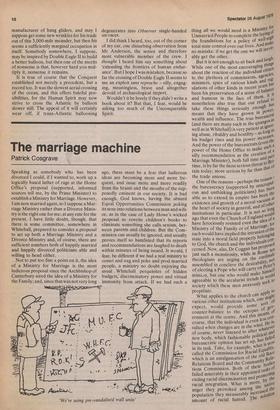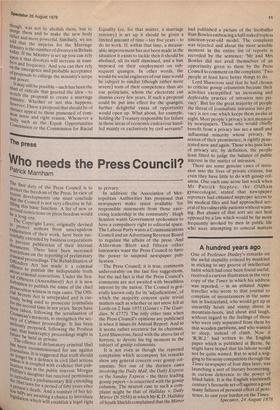The marriage machine
Patrick Cosgrave
Speaking as somebody who has been divorced I could, if I wanted to, work up a logically based lather of rage at the Home Office's proposal (supported, informed sources tell me, by the Prime Minister) to establish a Ministry for Marriage. However, I am now married again, so I suppose a Marriage Ministry rather than a Divorce Ministry is the right one for me; at any rate for the present. I have little doubt, though, that there is some committee, somewhere in Whitehall, prepared to consider a proposal to set up both a Marriage Ministry and a Divorce Ministry and, of course, there are sufficient numbers both of happily married and happily divorced politicians able and willing to head either.
Not to put too fine a point on it, the idea of a Ministry for Marriage is the most ludicrous proposal since the Archbishop of Canterbury aired the idea of a Ministry for the Family; and, since that was not very long ago, there must be a fear that ludicrous ideas are becoming more and more frequent, and issue more and more readily from the brains and the mouths of the supposedly eminent in our society. It is bad enough, God knows, having the absurd Equal Opportunities Commission poking its nose into relations between man and wife or, as in the case of Lady Howe's wicked proposal to rewrite children's books to eliminate something she calls sexism, between parents and children. But the Commission can usually be ignored, and usually proves itself so hamfisted that its reports and recommendations are laughed to death within minutes of being issued. It would, I fear, be different if we had a real ministry to cosset and nag and poke and prod married people, a ministry no doubt enjoying the usual Whitehall perquisites of hidden budgets, discriminatory power and virtual immunity from attack. If we had such a no mistake: if we get the one we will WO" the foundations for a policy of
thing all we would need is a Ministry fnr, Unmarried People to complete the laying 0,! total state control over our lives. And ma"e ably get the other. But it is not enough to sit back and laugh' While one of the most encouraging thillgs about the reaction of the individual citizen to the plethora of commissions, agencies' ministers, spies of various kinds and l'eg‘ ulations of other kinds in recent years has been his preservation of a sense of balance and humour in the face of them, it is nonetheless also true that our refusal t° take these things seriously enough has wer' meant that they have grown in P° wealth and influence. The true bureaucrat (and there are many such in the quangos as well as in Whitehall) is very patient at igrinr" ing abuse, ribaldry and hostility — as long as his budget rises and his power increases' And the power of the bureaucrats (even the power of the Home Office to make such, a silly recommendation as the creation oi at Marriage Minister), both full time and art Marriage
is by far the most serious threat to Bo;
°I °I h that tam today; ay; aidmohres.serious by far than aasc ar perhapsthe the bureaucracy roefatahcer areasons c y (supported p—poPer trehda ous and unthinking politicians) has bee'. able so to extend its empire has been the, existence and growth of a moral vacuuri al the heart of society in general, and of other institutions in particular. It is not so ago that even the Church of England Wcntria have ferociously resisted even the idea la,' Ministry of the Family or of Marriage, 1,1:!! such would have implied the intrusion of tn` state into a moral field properly belonging to God, the church and the individuals con; c erned. Now, alas, Dr Coggan has prop°se! just such a monstrosity, while in Rollie ter
j , theologians are urging on the cardinal: assembled in conclave the desirability, s
of electing a Pope who will carry on self mission, but one who would make finnsield agreeable to the secularist trends in Wf ' to society which these men anxiously see propitiate. What applies to the church can aPP13! tc' ht various other institutions which, one MIg expect, would provide some sort vv. counter-balance to the octopus of goof ernment at the centre. And this mcalr15, „, course, that the individual is even less co” is, suited when changes are in the wind. 14e,,et hatev of course, never listened to after w I and new body, which fashionable politica ed bureaucratic opinion has set up, has fallow in its task. Take, for example, what is called the Commission for Racial EtItiall4 which is an amalgamation of the 0 41,c1 Race which Board and the Commun•`, gdies tions Commission. Both of the ho. s _ failed miserably in their appointed tasictinvg ending racial discrimination and prom° the bY9 ive racial integration. What is more, anger they provoked among the II, Ih amount of racial hatred. Theease . population they measurably incr solo°
though, was not to abolish them, but to merge them and to make the new body richer and more powerful. Similarly, we are told that the impetus for the Marriage ,irlistry is the number of divorces in Britain "may. If the Ministry is set up you can rely
Pon it that divorces will increase in bets and and frequency. And you can then rely
on the emergence and probable acceptance of proposals to enlarge the ministry's scope and power.
It may still be possible —such has been the blast of ridicule that greeted the idea — to se°rch the proposal to create a marriage ministry. Whether or not this happens, however, I have a proposal that should be of distinct appeal to those possessed of cornMon sense and right reason. Whenever a body such as the -Equal Opportunities Commission or the Commission for Racial
Equality (or, for that matter, a marriage _ministry) is set up it should be given a limited amount of time — say five years — to do its work. If, within that time, a measurable improvement has not been made in the situation it exists to tackle then it should be abolised, all its staff dismissed, and a ban imposed on their employment on subsequent quangos. In other words, the would-be social engineers of our time would be subject to similar (though rather more severe) tests of their competence than are our politicians, whom the electorate can dismiss every few years. If such a proposal could be put into effect for the quangos, further delightful vistas of opportunity would open up. What about, for example, holding the Treasury responsible for failure in those areas of economic endeavour handled mainly or exclusively by civil servants?































 Previous page
Previous page